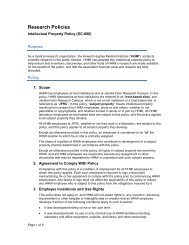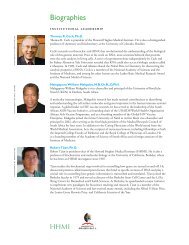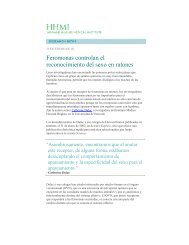Training Scientists to Make the Right Moves - Howard Hughes ...
Training Scientists to Make the Right Moves - Howard Hughes ...
Training Scientists to Make the Right Moves - Howard Hughes ...
You also want an ePaper? Increase the reach of your titles
YUMPU automatically turns print PDFs into web optimized ePapers that Google loves.
Chapter 6 Finding and Working with Speakers<br />
Narrowing Your Choice<br />
Once you have a list of potential speakers, you need <strong>to</strong> narrow <strong>the</strong> field.<br />
The suggestions below on how <strong>to</strong> proceed come from a cross-section of<br />
people responsible for creating training programs in scientific management.<br />
For each <strong>to</strong>pic, workshop, or session:<br />
Consider any budgetary constraints that will be a fac<strong>to</strong>r in narrowing<br />
down your list of speakers.<br />
Rank your <strong>to</strong>p candidates on <strong>the</strong> basis of comments from o<strong>the</strong>r<br />
people or your own assessment of <strong>the</strong> speakers.<br />
<strong>Make</strong> sure you have diversified your speaker portfolio. Look at your<br />
list of names and pick people with differences in experience (professional<br />
background and communication style) and career stage (e.g.,<br />
senior versus junior faculty). Demographics—gender, age, and marital<br />
and parental status—also can be relevant aspects of diversity, for<br />
example, for a panel about balancing home and work life. Differences<br />
in cultural perspectives should also be taken in<strong>to</strong> consideration, for<br />
example, in a panel session on men<strong>to</strong>ring. If you do not have enough<br />
diversity, ask around for additional referrals.<br />
Reassess your choices on <strong>the</strong> basis of who accepts your invitation. For<br />
example, if two women accept <strong>the</strong> invitation <strong>to</strong> sit on a three-person<br />
panel, you will probably want a male speaker for <strong>the</strong> third slot.<br />
A BIT ABOUT SPEAKERS’ FEES<br />
You will probably find at least some knowledgeable, engaging speakers from<br />
among your colleagues and contacts who will not expect remuneration<br />
beyond travel costs (However, you may want <strong>to</strong> give <strong>the</strong>se speakers a gift,<br />
say, a books<strong>to</strong>re gift certificate, as a way of saying thank you.)<br />
If you end up having <strong>to</strong> pay some speakers an honorarium, you should<br />
decide on <strong>the</strong> amount on <strong>the</strong> basis of your budget and what you are asking<br />
<strong>the</strong> speakers <strong>to</strong> do, and communicate that figure <strong>to</strong> <strong>the</strong> speakers when you<br />
first approach <strong>the</strong>m. Typical honoraria for speakers from academia run<br />
from about $300 <strong>to</strong> $1,000, depending on whe<strong>the</strong>r travel is involved and <strong>the</strong><br />
extent of <strong>the</strong> speaker’s participation in <strong>the</strong> training program. Professional<br />
consultants, on <strong>the</strong> o<strong>the</strong>r hand, will charge anything along a continuum of,<br />
say, $350 <strong>to</strong>tal for three hours <strong>to</strong> more than $600 per hour. Consultants<br />
usually state <strong>the</strong>ir fees up front, but if <strong>the</strong>y do not, it is your job <strong>to</strong> ask.<br />
Some consultants have an all-inclusive flat fee; o<strong>the</strong>rs charge for travel time,<br />
preparation work, or both. To avoid unpleasant surprises when <strong>the</strong> bill<br />
arrives, you need <strong>to</strong> know not only <strong>the</strong> fee but how it is calculated—everything<br />
<strong>the</strong> speaker considers billable time.<br />
49
















